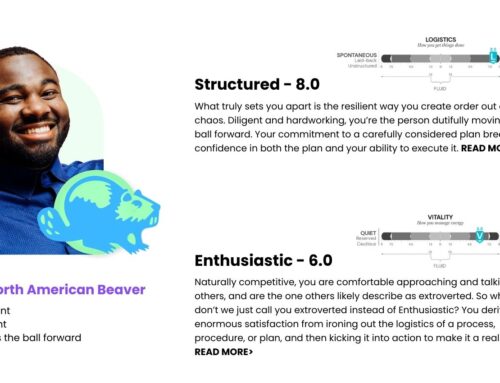The Dishwasher as Therapist
Of all the labor-saving devices in a home, few have sparked as many arguments as the dishwasher. Well, not the dishwasher itself, but how people choose to load it.
So contentious is the issue that one enterprising spouse – frustrated by his wife’s scattershot approach to the machine – coined the term, Dishwasher Loading Impairment Syndrome. Yeah, it’s serious stuff.
But the dishwasher can serve another important role: to remind us that personalities are unique and are reflected not just in the way we load the dishwasher, but in the way we do just about everything. So rather than trying to change the ones we love (or at least share a dishwasher with), perhaps we instead marvel at the diversity of perspective.
(And just for fun, take our free assessment and then guess what kind of dishwasher loader you and your loved ones are.)
Personality as Predictor
In a modest, unofficial survey, we asked a handful of our subscribers to describe how they load the dishwasher. Then we compared their responses to the results of their ALIVE Big 5 personality assessment. As expected, their most dominant personality traits aligned almost perfectly with their approach to loading dishwashers.
I go through the dishwasher and move things around that everyone else just throws in there. Drives me crazy! – Christy M., Structured
Those who ranked strongly toward the Structured end of the Logistical trait, for example, described their approach as orderly and process-driven. For these individuals, the dishwasher’s many prongs, slots, and rows served as logical guides for organizing its contents for maximum load and cleaning capacity.

Their more Spontaneous, laid-back counterparts, on the other hand, didn’t really care one way or another. Their goal was just to get the dishes into the machine.
Our survey also asked individuals to explain their reaction to someone else’s approach to loading the dishwasher. Again, as you might expect, personality proved to be a fantastic predictor.
For example, those who scored strongly toward the Giving end of the Accommodation trait were more or less unfazed even if the other person’s approach didn’t jibe with their own. Accustomed to being polite and even putting the needs of others ahead of their own, these Giving types proved adept at going with the flow.

At the opposite end of that same trait, however, their more Resolute counterparts were easily triggered by loading practices that didn’t coincide with their own.
All of this is, again, unofficial, but darned if it didn’t prove highly predictable.
The Dishwasher as a Metaphor for Life
This is why understanding one’s own personality can be so helpful in shedding light on why we do the things we do.
It’s also why it helps to understand not just your own personality but also the personalities of those around you (a process made infinitely easier when you understand your own). Why? Because those who lack self-awareness are essentially doomed to repeat the same behaviors over and over again, always expecting a different outcome.
I honestly don’t think much about how a dishwasher is designed. I just find a spot and put something in there. – John K, Spontaneous.
When it comes to the behavioral sciences, it can be helpful to remember:
- Your personality is more or less in place by the age of 9 or 10. This means any ideas you or your mate have – about dishwashers or pretty much anything else – pre-date that adult version of you. Doesn’t mean these behaviors can’t change, only that we all start from a default perspective driven in part by our personality.
- If your mate doesn’t heed the organizing influence of your dishwasher’s rows and slots, he’s not doing it on purpose, it’s just the way he sees the world. Chances are good he’s also got talents you lack.
- This crazy mix of personality traits is what keeps life so enjoyable and interesting. If everyone marched to the tune of the same drummer life would become dull pretty quickly.
- A personality trait isn’t a 100% accurate predictor of behavior. (But it can help.)
The Dishwasher as Therapist
Of all the labor-saving devices in a home, few have sparked as many arguments as the dishwasher. Well, not the dishwasher itself, but how people choose to load it.
So contentious is the issue that one enterprising spouse – frustrated by his wife’s scattershot approach to the machine – coined the term, Dishwasher Loading Impairment Syndrome. Yeah, it’s serious stuff.
But the dishwasher can serve another important role: to remind us that personalities are unique and are reflected not just in the way we load the dishwasher, but in the way we do just about everything. So rather than trying to change the ones we love (or at least share a dishwasher with), perhaps we instead marvel at the diversity of perspective.
(And just for fun, take our free assessment and then guess what kind of dishwasher loader you and your loved ones are.)
Personality as Predictor
In a modest, unofficial survey, we asked a handful of our subscribers to describe how they load the dishwasher. Then we compared their responses to the results of their ALIVE Big 5 personality assessment. As expected, their most dominant personality traits aligned almost perfectly with their approach to loading dishwashers.
I go through the dishwasher and move things around that everyone else just throws in there. Drives me crazy! – Christy M., Structured
Those who ranked strongly toward the Structured end of the Logistical trait, for example, described their approach as orderly and process-driven. For these individuals, the dishwasher’s many prongs, slots, and rows served as logical guides for organizing its contents for maximum load and cleaning capacity.

Their more Spontaneous, laid-back counterparts, on the other hand, didn’t really care one way or another. Their goal was just to get the dishes into the machine.
Our survey also asked individuals to explain their reaction to someone else’s approach to loading the dishwasher. Again, as you might expect, personality proved to be a fantastic predictor.
For example, those who scored strongly toward the Giving end of the Accommodation trait were more or less unfazed even if the other person’s approach didn’t jibe with their own. Accustomed to being polite and even putting the needs of others ahead of their own, these Giving types proved adept at going with the flow.

At the opposite end of that same trait, however, their more Resolute counterparts were easily triggered by loading practices that didn’t coincide with their own.
All of this is, again, unofficial, but darned if it didn’t prove highly predictable.
The Dishwasher as a Metaphor for Life
This is why understanding one’s own personality can be so helpful in shedding light on why we do the things we do.
It’s also why it helps to understand not just your own personality but also the personalities of those around you (a process made infinitely easier when you understand your own). Why? Because those who lack self-awareness are essentially doomed to repeat the same behaviors over and over again, always expecting a different outcome.
I honestly don’t think much about how a dishwasher is designed. I just find a spot and put something in there. – John K, Spontaneous.
When it comes to the behavioral sciences, it can be helpful to remember:
- Your personality is more or less in place by the age of 9 or 10. This means any ideas you or your mate have – about dishwashers or pretty much anything else – pre-date that adult version of you. Doesn’t mean these behaviors can’t change, only that we all start from a default perspective driven in part by our personality.
- If your mate doesn’t heed the organizing influence of your dishwasher’s rows and slots, he’s not doing it on purpose, it’s just the way he sees the world. Chances are good he’s also got talents you lack.
- This crazy mix of personality traits is what keeps life so enjoyable and interesting. If everyone marched to the tune of the same drummer life would become dull pretty quickly.
- A personality trait isn’t a 100% accurate predictor of behavior. (But it can help.)



